🇪🇸🇵🇹🇮🇹 Southern Europe’s AI Workforce: Can Spain, Portugal, and Italy Compete with the North?
As the AI revolution accelerates across Europe, Southern countries like Spain, Portugal, and Italy face a critical moment. Despite growing investments and emerging tech ecosystems, the region still struggles with limited AI workforce density, brain drain, and gaps in university-to-industry transitions — especially when compared to Germany and the Nordics.
As highlighted in Europe’s regional growth gaps and AI competitiveness trends in 2025, the South must now decide whether it can retain its best minds — or risk being left behind.
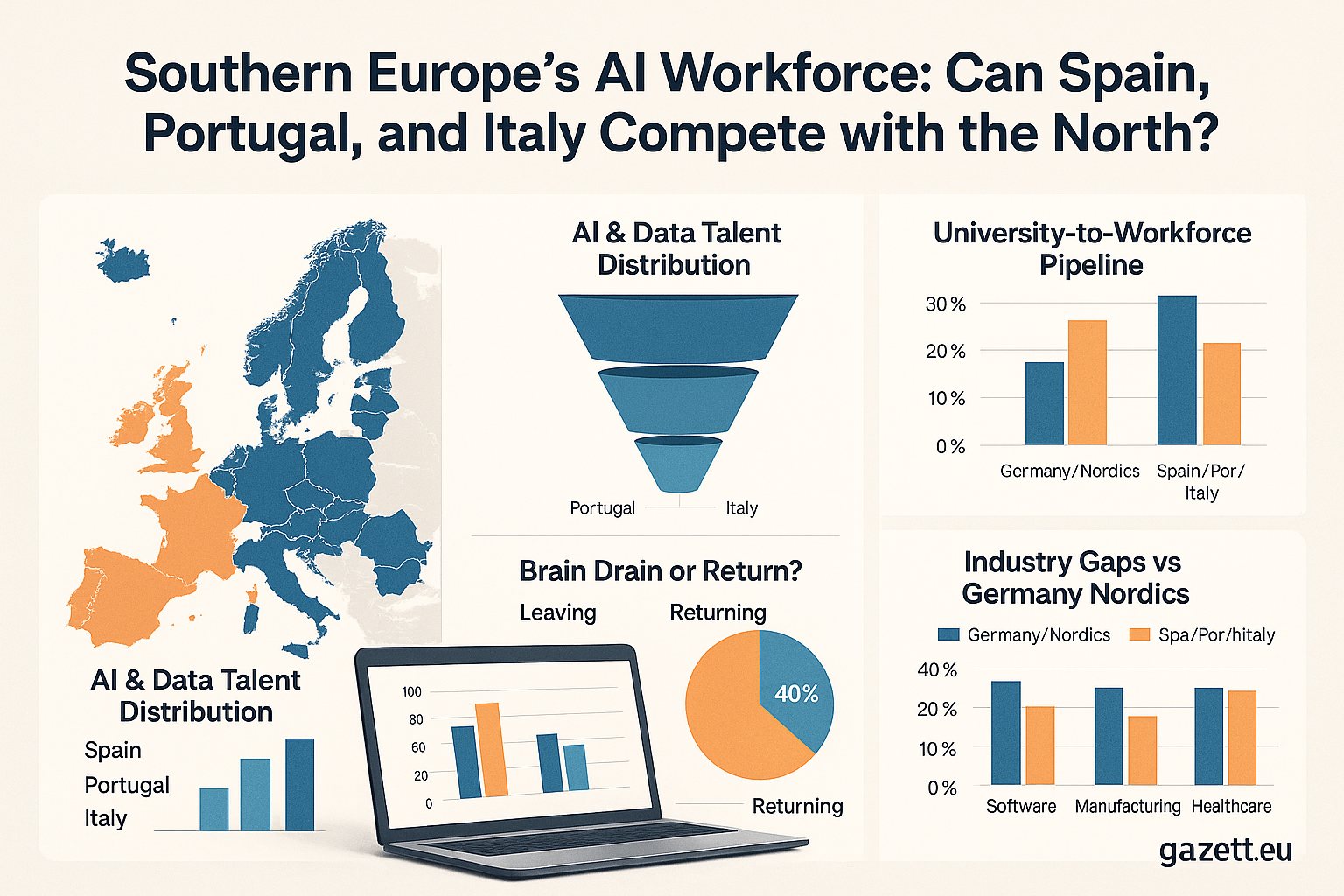
📷 Visual: AI Workforce Landscape in Southern Europe
📚 Article Overview
🧠 AI & Data Talent Distribution in the South
Despite increasing investment in artificial intelligence, Southern Europe’s AI workforce remains underdeveloped compared to Northern counterparts. Spain, for example, allocates 6.4% of its Digital EU Recovery funds to AI — the second-highest in the region — yet still trails in deploying industry-ready engineers. Portugal and Italy face similar issues: significant government support but slower private sector absorption.
A recent report by Interface EU revealed that Northern and Western Europe attract more international AI professionals through competitive salaries and research ecosystems. In contrast, Southern countries remain reliant on domestic training pipelines, which slows down AI deployment in core sectors like manufacturing, healthtech, and logistics.
- 📊 Spain: Leading in AI budget allocation, yet ranks below Germany in AI job creation per capita.
- 📍 Portugal: Strong in Lisbon-based startups, but talent exits for Amsterdam and Berlin remain high.
- 📉 Italy: Advanced research centers in Milan exist, but AI engineers are fewer than in Nordic clusters.
Related read: Europe's Tech Unicorn Growth highlights how workforce distribution influences startup ecosystems across EU regions.
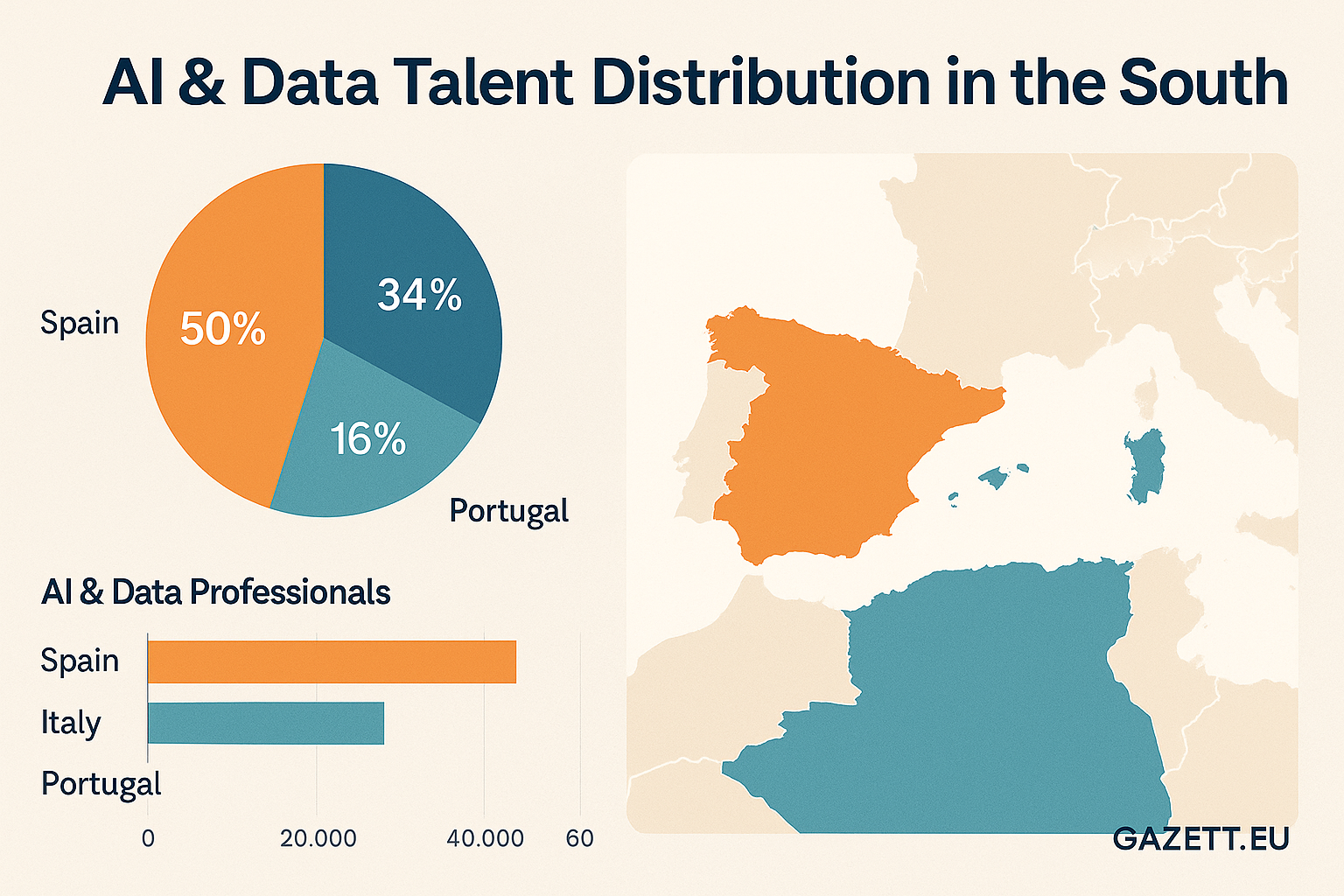
📷 Visual: AI Talent Density Across Southern Europe (Spain, Portugal, Italy)
🏫 University-to-Workforce Pipelines
Universities in Southern Europe have ramped up their focus on AI education and data science curricula — but translating academic talent into real-world industrial impact remains a work in progress. Top institutions like Polytechnic University of Milan and Universidad Politécnica de Madrid now offer AI-dedicated degrees, often in partnership with global tech leaders such as IBM, Microsoft, and Siemens.
However, the lack of structured university-industry collaboration and limited startup incubation funding in many Southern universities weakens the conversion of graduates into AI innovators. Northern Europe excels at this — with Sweden, Denmark, and Germany maintaining strong research parks, industrial PhD pipelines, and public-private innovation zones.
- 🎓 Italy: Milan and Bologna offer AI Master's programs, but industry tie-ins remain limited outside major cities.
- 📚 Spain: Madrid's public universities are launching AI certification bootcamps, but graduate retention is still weak.
- 🧪 Portugal: Lisbon’s Nova University and Técnico Lisboa lead AI research, yet private sector linkages lag behind.
In contrast, countries like Germany have institutionalized research-industry bridges via clusters like Germany’s Industrial Revival Plan, accelerating student-to-startup transitions.
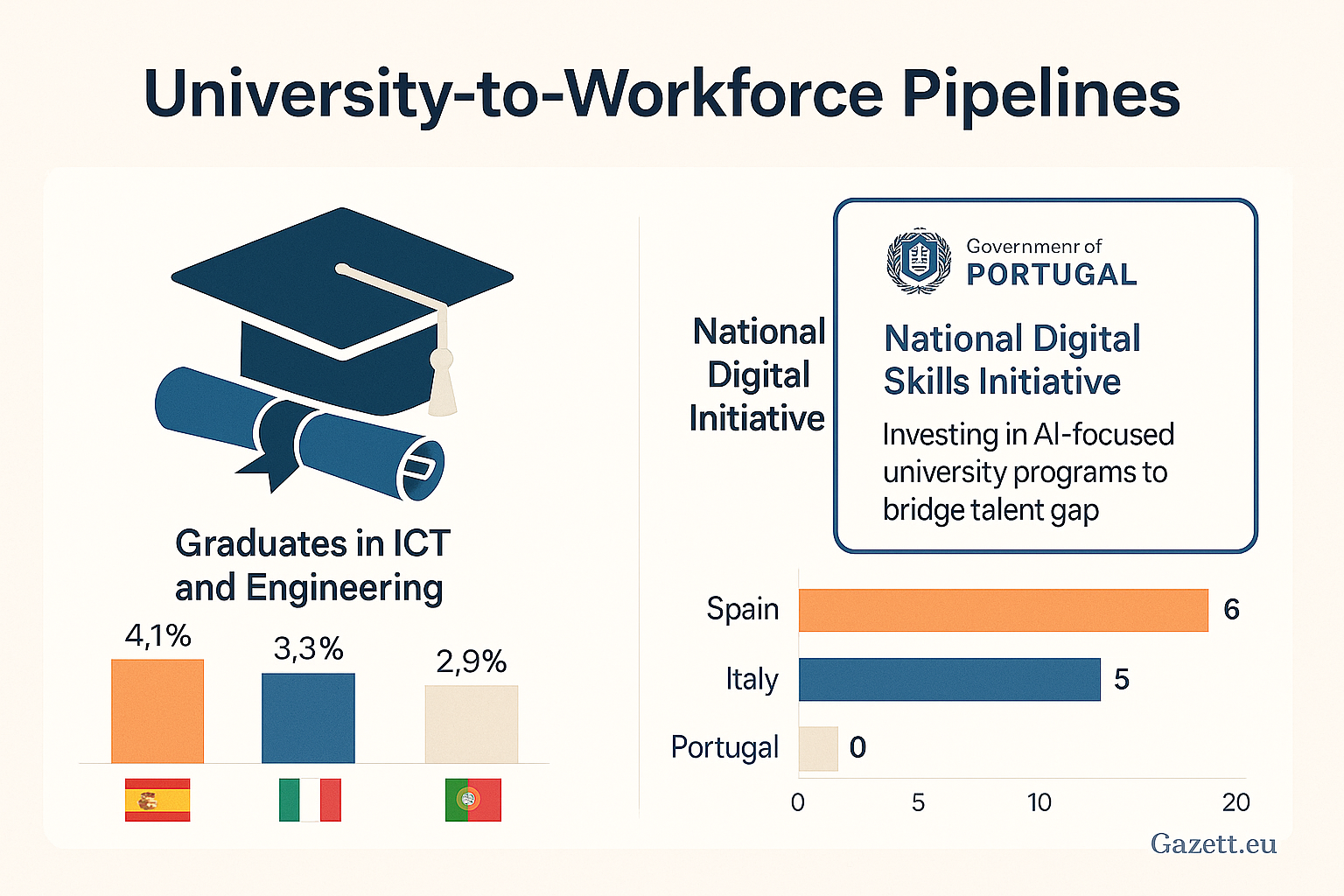
📷 Visual: AI Education-to-Employment Pipeline in Southern Europe
💻 Industry Gaps vs Germany/Nordics
One of the key challenges for Southern Europe is the limited integration of AI across traditional industries. While countries like Germany, Sweden, and Finland embed AI into core sectors such as automotive, pharmaceuticals, and smart logistics, Southern counterparts still focus heavily on pilot projects and public-sector AI trials.
According to Maximize Market Research, Northern Europe leads in AI industrial adoption by volume, maturity, and funding. In contrast, Spain and Italy show strength in niche AI applications — tourism tech, language processing, and agriculture — but lack deep B2B integration into supply chains.
- 🚗 Germany: AI is powering predictive maintenance in car manufacturing and logistics automation.
- 🧠 Sweden & Finland: Leading in AI for healthcare diagnostics and public digital services.
- 📱 Spain & Portugal: High startup activity in AI-powered chatbots and tourism experience platforms — but limited scale.
The competitive gap in industrial AI strategy was also noted in Europe’s Strategic Shift on Tech Defense Funding, where most funds still flow northward toward defense and R&D clusters.
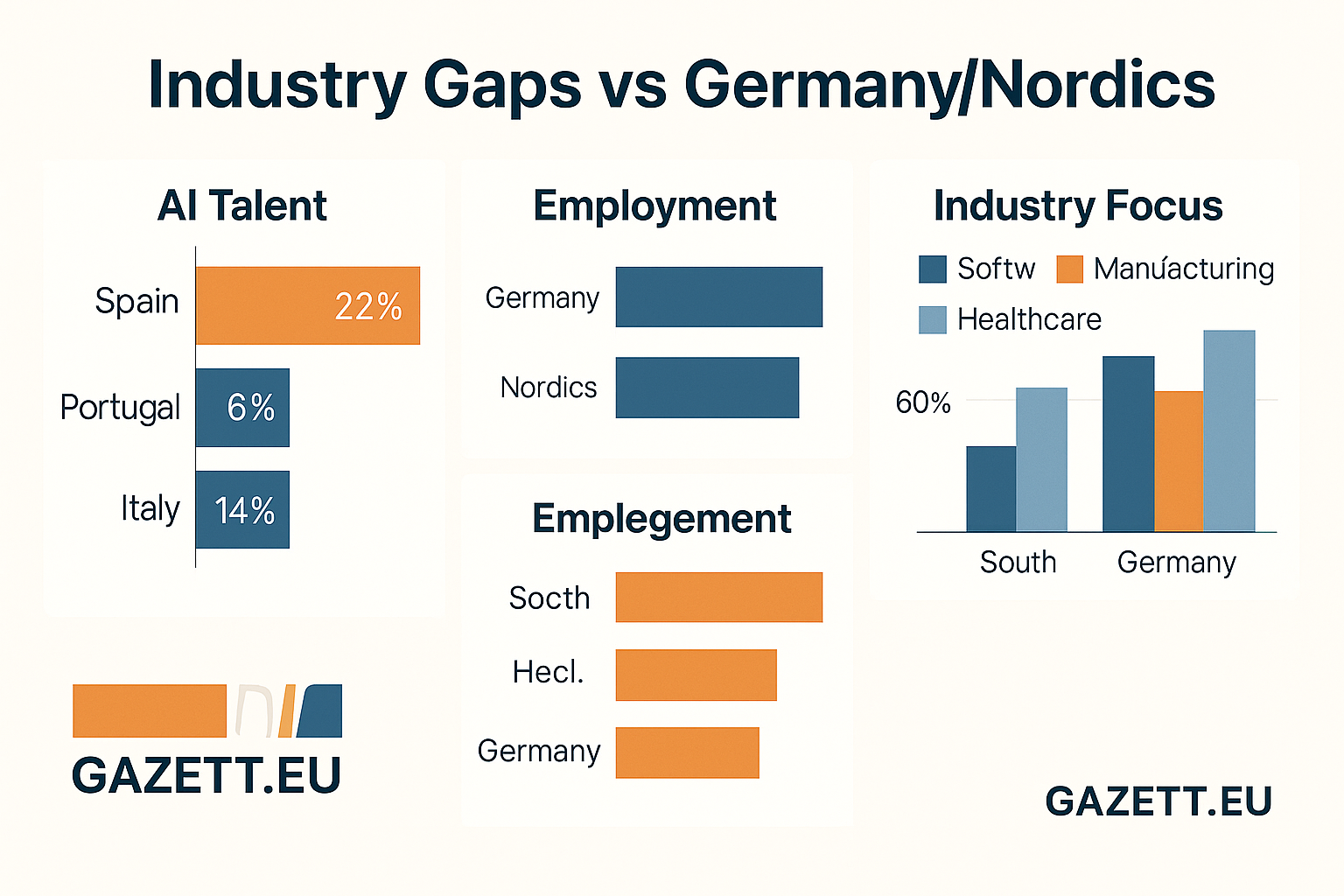
📷 Visual: Industrial AI Integration – North vs South Europe (2025)
✈️ Brain Drain or Remote Return?
One of the most pressing challenges for Southern Europe’s digital future is its ongoing brain drain. Thousands of highly qualified AI engineers, data scientists, and research PhDs from Spain, Italy, and Portugal are migrating to Germany, the UK, and the U.S. — drawn by higher salaries, richer innovation ecosystems, and more robust R&D labs.
A 2024 report by Reuters notes that over 30% of tech graduates in Portugal and Italy relocate within 18 months of graduation. While Portugal has introduced zero-tax residency incentives for returning professionals, Italy’s 2025 move to tighten expat tax breaks is expected to worsen outbound migration.
- 📉 Italy: Recent rollback of the expat tax regime may accelerate talent loss to France and Germany.
- 💼 Portugal: Remote work schemes and fiscal benefits aim to reverse talent flight — early results show promise.
- 🌍 Spain: Tech expats are exploring partial return models — living abroad but consulting on home soil.
Broader context: Our piece on Europe's Job Market in 2025 outlines how remote work trends are reshaping cross-border digital careers.
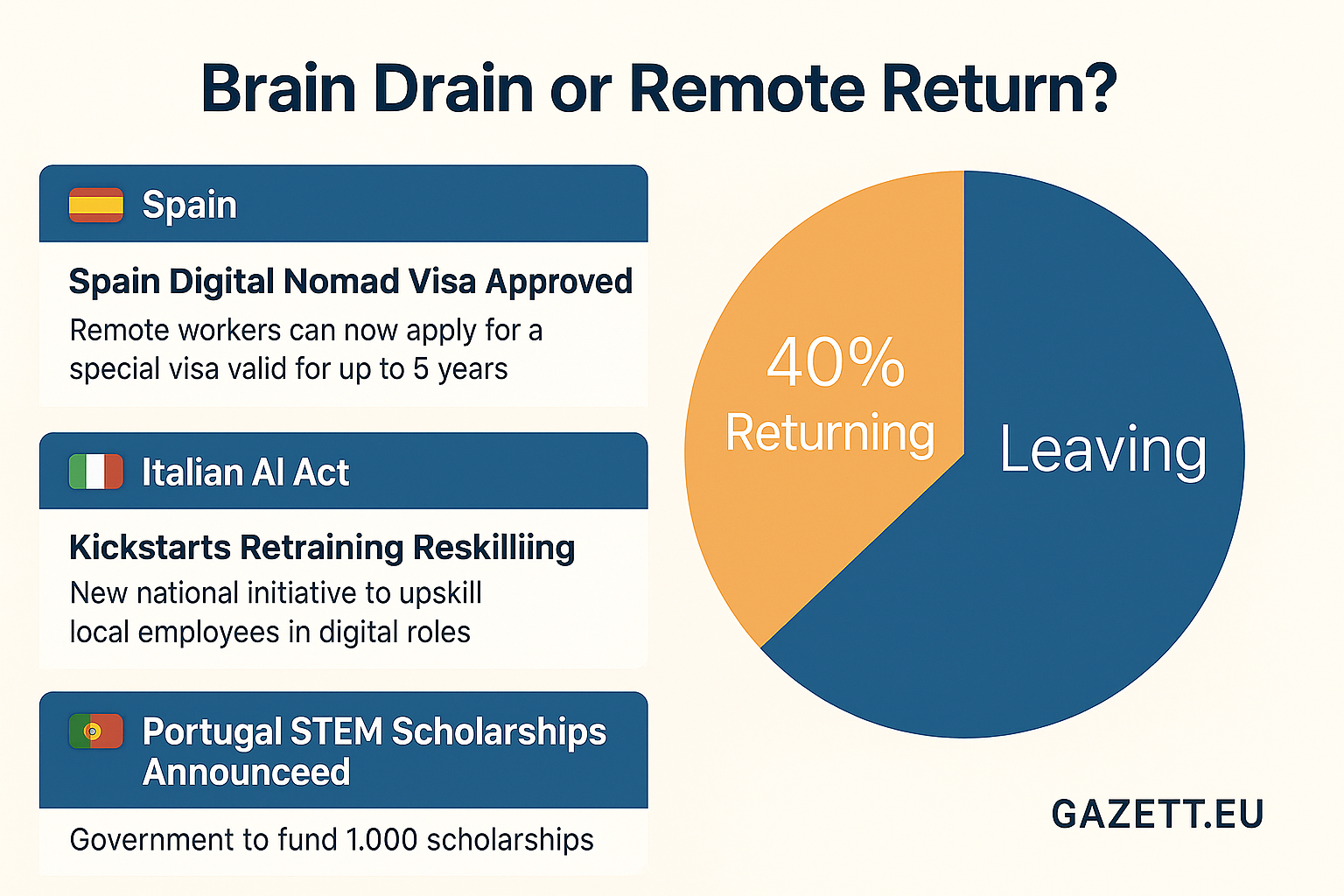
📷 Visual: AI Talent Outflow and Return Pathways in Southern Europe
🎥 Real Snippets & Industry Videos
🔔 Official Updates & Notifications
- 🇵🇹 Portugal’s Remote Talent Law 2025: New legislation offers zero-tax benefits for returning AI engineers and tech founders. (Source: Portugal Official Bulletin)
- 🇮🇹 Italy’s Expat Tax Reform 2025: Clampdown on tax breaks for returning professionals may trigger fresh brain drain. (Source: Italian Government Official)
- 🇪🇸 Spain’s Digital Nomad Visa Expansion: New program offers residency to non-EU tech workers with flexible AI sector eligibility. (Source: La Moncloa Official Site)
🎓 Building Southern Europe's AI Future
Insights from Lisbon’s Web Summit 2025 on how Portugal aims to become an AI talent hub by 2030.
🚀 Spain’s Startup Cities: Madrid and Barcelona Rising
Real-world coverage on Spain's tech ecosystem transformation and its impact on retaining AI graduates.
📝 Conclusion & Key Takeaways
Southern Europe’s AI journey in 2025 presents a story of ambition and imbalance. While Spain, Portugal, and Italy are aggressively expanding AI education programs and investing in startup ecosystems, systemic issues such as limited industry integration, persistent brain drain, and slow research-to-business conversion continue to hinder competitiveness against Northern Europe.
Closing this gap will require governments, universities, and industries across the South to not only accelerate AI-focused reforms but also create stronger incentives to retain and attract homegrown digital talent.
| Key Point | Details |
|---|---|
| Trend | Increased AI education investment across Spain, Portugal, and Italy |
| Opportunity | Remote work frameworks and digital nomad policies to retain AI professionals |
| Challenge | Brain drain and limited AI integration into traditional industries |
Sources: Euronews, Interface EU, Reuters, Maximize Market Research